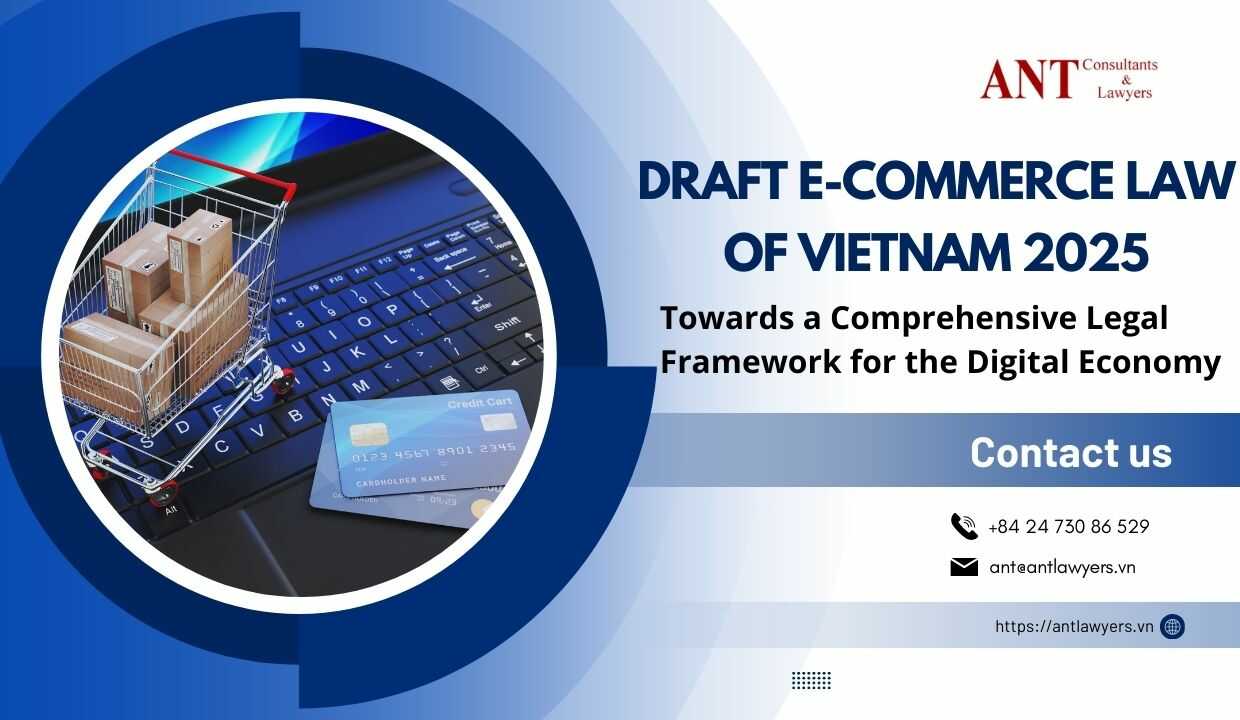Draft E-Commerce Law of Vietnam 2025: Towards a Comprehensive Legal Framework for the Digital Economy


Draft_E-Commerce_Law_of_Vietnam_2025
In the era of the Fourth Industrial Revolution and the rapid expansion of digital technology, e-commerce (E-commerce) has become an indispensable part of the global economy. In Vietnam, e-commerce not only creates opportunities for businesses and consumers but also poses challenges in management and legal frameworks. To address these needs and provide a robust legal foundation for e-commerce activities, the Ministry of Industry and Trade has proposed the development of the E-commerce Law, expected to be submitted to the National Assembly in 2025.


The Need for the E-Commerce Law
Currently, e-commerce activities in Vietnam are mainly governed by Decree No. 52/2013/ND-CP and Decree No. 85/2021/ND-CP. However, the rapid growth of technology and the emergence of new business models have revealed several limitations in these regulations:
- Limited scope of regulation: Existing decrees do not adequately cover the complexities and diversity of e-commerce, especially new business models like livestream sales or cross-border e-commerce.
- Inconsistencies with other laws: Overlaps and inconsistencies between e-commerce regulations and other laws, such as the Law on Consumer Protection, the Law on Tax Administration, and the Law on Intellectual Property, create challenges in enforcement and management.
- Inadequate alignment with international standards: Vietnam needs a legal framework for e-commerce that aligns with international commitments and best practices in the context of global economic integration.
Thus, the development of the E-commerce Law is essential to establish a comprehensive, consistent, and effective legal framework, addressing practical demands and promoting the sustainable growth of e-commerce in Vietnam.
Objectives of the E-Commerce Law
The E-commerce Law aims to achieve the following objectives:
- Institutionalize the policies of the Party and the State on e-commerce: Ensure that e-commerce activities align with the orientation of digital economy development and international integration.
- Create a clear and transparent legal framework: Define the rights and obligations of parties participating in e-commerce, including domestic and international merchants, organizations, and individuals.
- Protect consumer rights: Ensure safety, privacy, and consumer rights in e-commerce transactions.
- Promote the development of the digital economy: Encourage innovation, technology application, and the growth of new business models in e-commerce.
- Strengthen state management: Enhance the effectiveness of management, supervision, and enforcement of violations in e-commerce, especially in cross-border activities.
Scope and Subjects of Application
The E-commerce Law will regulate activities related to the development, application, and management of e-commerce within Vietnam. Subjects of application include:
- Domestic merchants, organizations, and individuals: Businesses, organizations, and individuals engaged in e-commerce within the country.
- Foreign individuals residing in Vietnam: Foreigners living and conducting e-commerce activities in Vietnam.
- Foreign merchants and organizations operating in Vietnam: Businesses and organizations providing goods and services through e-commerce platforms to the Vietnamese market.
Key Provisions of the Draft E-Commerce Law
The draft E-commerce Law consists of 7 chapters with 40 articles, focusing on the following main contents:
1. General Provisions: Definitions, scope, subjects of application, and principles of e-commerce activities.
2. Electronic Contract Formation: Regulations on the formation of electronic contracts and the rights and obligations of parties in online transactions.
3. E-Commerce Activities:
- E-commerce platforms for selling goods: Conditions for operation and responsibilities of online selling platforms.
- Intermediary e-commerce platforms: Roles and responsibilities of intermediary platforms like marketplaces and online ordering applications.
- Cross-border e-commerce: Responsibilities of foreign merchants and organizations providing goods and services to Vietnamese consumers through online platforms.
4. Rights and Obligations of Parties in E-Commerce Transactions
The draft law outlines detailed rights and obligations for parties involved in e-commerce transactions, including:
- Sellers: Must provide complete and accurate information about products, services, transaction terms, and warranty policies. Sellers are also responsible for resolving complaints and fulfilling financial obligations.
- Buyers: Have the right to privacy, the right to cancel orders under certain conditions, and the right to complain in case of disputes. Buyers must comply with payment and product usage regulations.
- E-commerce platforms: Must monitor and verify seller information, establish consumer protection policies, and assist government authorities in oversight and violation handling.
5. Consumer Protection in E-Commerce
The draft law emphasizes the importance of protecting consumers in the digital environment, focusing on:
- Data Privacy: Ensuring the protection of personal information and granting consumers control over how their data is used by e-commerce platforms.
- Transaction Cancellation Rights: Allowing consumers to cancel transactions
- Dispute Resolution Mechanisms: Establishing fast and transparent mechanisms for resolving disputes among consumers, sellers, and platforms.
6. Taxation and Financial Responsibilities
Tax obligations are a critical aspect of the draft law, especially for:
- Foreign merchants: Foreign platforms generating revenue from e-commerce activities in Vietnam must register and fulfill tax obligations in accordance with Vietnamese laws.
- Withholding tax mechanism: The draft proposes implementing a withholding tax mechanism for e-commerce transactions to minimize tax evasion.
7. State Management of E-Commerce
To enhance governance, the draft E-commerce Law proposes measures to strengthen state management, including:
- Registration and Information Management Systems: E-commerce platforms must register with regulatory authorities and regularly report transaction data.
- Inspection and Supervision: Enhancing inspection and monitoring of e-commerce activities to promptly detect and address violations.
- International Cooperation: Promoting collaboration with international organizations and other countries to manage cross-border e-commerce and resolve international disputes.
Challenges in Implementing the E-Commerce Law
Despite its benefits, the E-commerce Law faces several challenges, such as:
- Implementation Consistency: Effective enforcement requires coordination across multiple agencies and sectors.
- Digital Infrastructure: Significant investments are needed to improve digital infrastructure and ensure cybersecurity.
- E-commerce Fraud: Addressing fraud and scams in the online environment requires strict management and penalties.
Impact of the E-Commerce Law on the Digital Economy
Once enacted, the E-commerce Law is expected to bring numerous benefits:
- Business Development: Facilitate participation in e-commerce for businesses, especially small and medium enterprises (SMEs).
- Consumer Trust: Provide a safe and transparent legal environment, fostering consumer confidence in online transactions.
- International Integration: Ensure Vietnam’s legal framework aligns with commitments under free trade agreements and international standards.
The Draft E-Commerce Law of 2025 represents a significant step towards establishing a modern legal framework aligned with the development of the digital economy. With detailed and comprehensive regulations, the law aims to support the growth of e-commerce within Vietnam and position the country as a leading e-commerce hub in the region.
About ANT Lawyers, a Law Firm in Vietnam
We help clients overcome cultural barriers and achieve their strategic and financial outcomes, while ensuring the best interest rate protection, risk mitigation and regulatory compliance. ANT lawyers has lawyers in Ho Chi Minh city, Hanoi, and Danang, and will help customers in doing business in Vietnam.
How ANT Lawyers Could Help Your Business?
You could learn more about ANT Lawyers E-commerce Lawyers in Vietnam or contact our lawyers in Vietnam for advice via email ant@antlawyers.vn or call our office at +84 28 730 86 529
Recent Posts
7 Essential Truths to Open an Indirect Investment Account in Vietnam and Grow with Confidence
Do you want to invest overseas into Vietnam? Do you want to open an indirect…
5 Crucial Facts About ESG Laws in Vietnam That Could Save Your Business and Reputation
The Business World Is Changing Fast Rules are shifting. Expectations are rising. Eyes are watching. …
7 Powerful Reasons Why ESG Compliance in Vietnam Will Win You Trust, Growth, and Global Clients
Trust matters. Today, more than ever. Across industries, many companies are now being asked. directly…
7 Bold Reasons Why Tokenization in Vietnam Could Transform Your Future
Change is coming. Quietly. Digitally. Rapidly. Let’s imagine the situation, which assets are no longer…
Vietnam P2P Lending: 5 Bold Reasons Why Decree 94/2025 Could Empower Millions or Backfire?
A New Financial Chapter Begins in Vietnam One person lends. Another borrows. It’s that simple.…
5 Essential Lessons from Risk Management in Digital Assets in Vietnam: Protecting Trust in a Digital World
Trust Is the Real Currency Money can be lost. Tokens can vanish. Platforms can crash.…




